#mytop10series
Explore tagged Tumblr posts
Note
What are your top 5 (or top 10) favorite media ever (can be anime/manga, tv series, books, movies, games, etc)? Why love them? Thanks ⭐
[ In all honesty, as I was going through my inbox, I was dreading responding to this ask. Not because the question was awful—it's a great question. The problem is that I'm quite indecisive and tend to overthink things. I'm going to attempt to keep this brief because if I allow myself to ramble, it will take me a month to write this post—and by then I'll have changed my mind. (Spoiler Alert: I failed lmao)
As I've already stated, I typically only consume anime/donghua and manga/manhua/manhwa, so my list will be confined to those. I have conflicting feelings about many of the series I've seen, especially those that have ended recently—because, let's be honest, manga endings have been terrible lately (if you know, you know)...
Another issue is that I've been attempting to restructure my top ten because my entire concept of what constitutes a great series has shifted recently. For a long time, I had subconsciously internalised the notion that shoujo/josei series and non-combat-orientated series were inferior to mainstream battle-focused shounen series.
I subconsciously thought that I would be looked down on for including these series in my top 10 over more respected manga. Although it persists to some extent, I was mostly able to get over this after learning about biases in the anime and manga industries on how shoujo versus shounen series are handled and perceived. ]
✧⋄⋆⋆⋄✧⋄⋆⋅⋆⋄✧⋄⋆⋅⋆⋄✧⋄⋆⋅⋆⋄✧⋄⋆⋅⋆⋄✧⋄⋆⋆⋄✧
Top 10 Favourite Series:
#10 The Apothecary Diaries
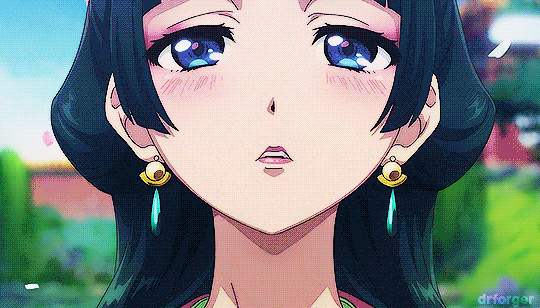
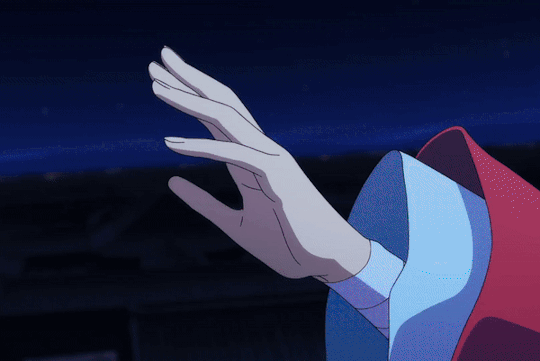
This show has captured my attention even though I have only seen the first season. Although Maomao and Jinshi's dynamic is undeniably my favourite part of the series, its complex themes and political intrigue are not to be understated either. Another aspect I like about the series is its unique incorporation of femisism. It uses its rigidly misogynistic historical setting to highlight the subtle strength, ingenuity, and resolve that women rely on to navigate and endure society. Even amongst a society that devalues women and fosters competition among them, we observe women supporting one another and persevering. In this manner the series provides a refreshing standpoint on female empowerment. The adaptation was perfectly executed, as exemplified by its undeniably captivating aesthetics, music, and ambience. I'm eagerly anticipating season 2 and can't wait to see where the series goes.
#09 Link Click
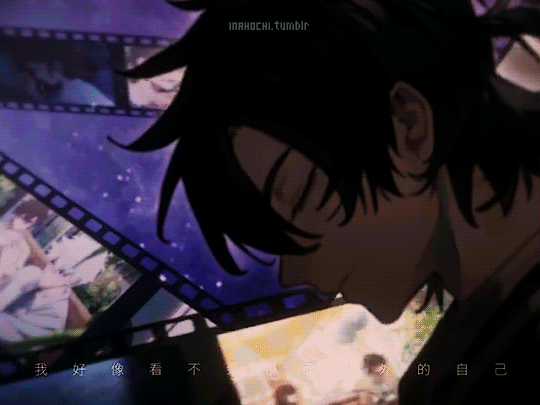
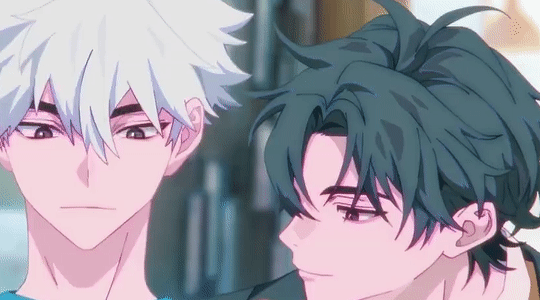
While at first, it may not seem like much, this show has really developed into something refreshingly brilliant thanks to its unique supernatural abilities and ever-increasing stakes. Aside from its unique art style, compelling twists, and captivating storytelling, all of which are refreshingly good, the music is definitely my favourite part of this show, as it is carefully crafted to complement the narrative. The dynamic between our two leads is incredibly endearing and heartbreaking. The symbolism is incredibly intricate and complex and is intertwined masterfully into every aspect of its production—most notably its character designs, music, and visuals. Every episode leaves you on the most stressful cliffhanger of your life, leaving you eager for more.
#08 Mo Dao Zu Shi

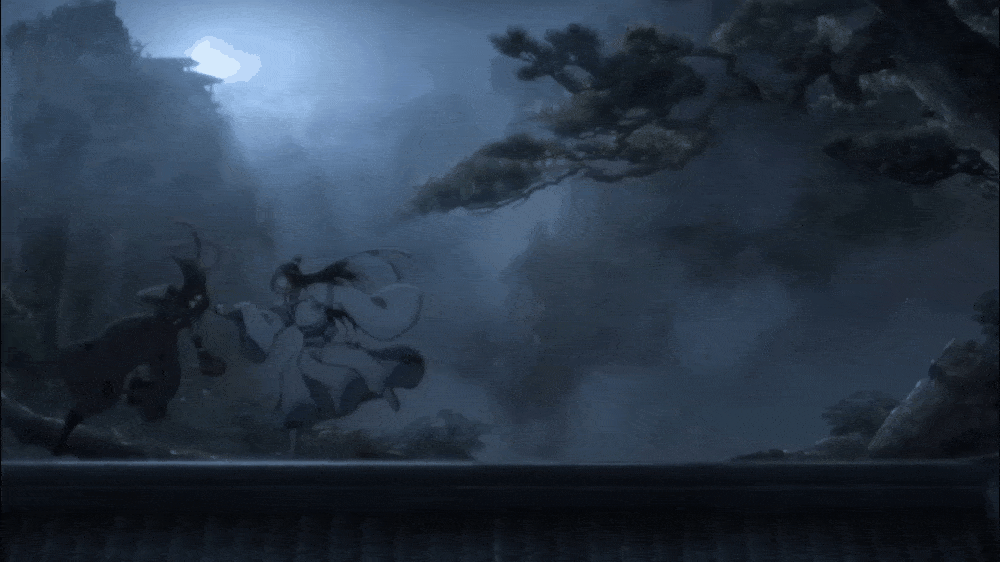
My favourite part of this series is that there are so many different mediums to experience it through, with each one providing a slightly different experience. While the novel and Donghua are my personal favourite adaptations, the C-drama was very entertaining as well. I hope to be able to experience the manga, manhua and audio drama adaptations as well. Its story and characters are so intricate and multi-faceted that trying to describe them in such a short paragraph would be laughable, so I'll refrain from doing so. This series combines action, mystery, and romance with complex themes and vibrant characters. MDZS is unquestionably the most exceptional MXTX novel in the field of world-building. The story is set in an intricately crafted world in which historic customs, mystical abilities, and martial arts intersect, with each setting playing a critical role in the development of the characters and their journeys. This was the first series I watched featuring a canonical M/M main pairing that also possessed a robust and compelling plot beyond the romance, which I greatly appreciated. The heart of the series is its compelling cast of characters. WangXian's dynamic is the foundation of the series and is undeniably one of my favourite aspects of it. Their contrasting personalities are deftly counterbalanced by their similar ideals and shared passion for protecting others. Their relationship is an attestation of the enduring power of love and is centred on the themes of transformation, loyalty, and sacrifice. The series addresses a variety of complex themes, including enduring love, filial piety, vengeance, justice, acceptance, redemption, forgiveness, corruption, morality and perseverance despite adversity. The most apparent themes in the narrative are social prejudices, the interplay between perceptions and actuality as well as the dichotomy between good and evil.
#07 Kimetsu No Yaiba
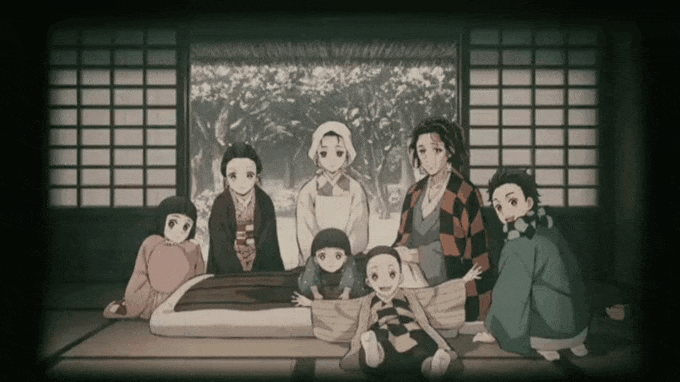

Inexplicably, this series is both exceedingly popular and heavily criticised. It is generally critiqued for its simplistic story, but I believe it exemplifies how simplicity is the ultimate sophistication. People often fixate on its stunning animation and thrilling battles, overlooking its powerful emotional narratives and seamless integration of complex themes. The series centres around themes such as the importance of family, coping with loss, and maintaining resilience and determination in the face of adversity. That said, my favourite theme in the series is how it highlights the significance of compassion and empathy, even amidst extenuating circumstances. This is a vital lesson that reminds us that we are all capable of demonstrating compassion and empathy to others within reasonable limits. Alongside its compelling narrative and dynamic battles, KNY's eclectic ensemble of well-developed characters stands out—thanks to their distinct designs and motivations—lending depth and complexity to the series.
#06 Akatsuki No Yona
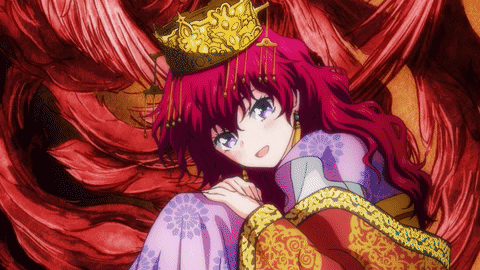
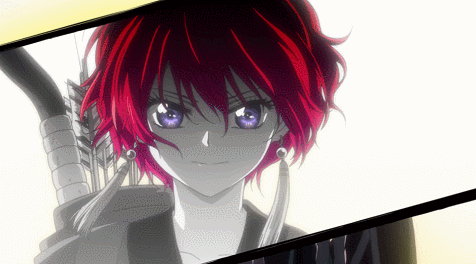
Although YOTD seems like another archetypal historical romance about a princess on the run—there is so much more to this series. YOTD is a masterful blend of romance, adventure, and drama. The series deftly reworks conventional tropes and integrates them into its intricate, fantastical setting. YOTD's multi-layered narrative and its profound character arcs—in addition to the depth of themes it addresses—set it apart from comparable series. The manga incorporates various heavy themes into its narrative—such as betrayal, vengeance, inequality, power struggles, and the connection between privilege and ignorance. It also covers more hopeful themes—such as camaraderie, courage, and the enduring power of love. YOTD's primary strength is its remarkable character development. Each of the series' characters is thoughfully constructed to embody several themes that add to the plot, while every one of their interactions helps to advance other characters.
#05 Boku No Hero Academia

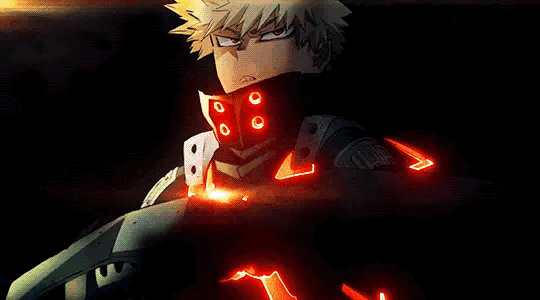
Although this series mostly garnered popularity from its compelling plotline and flashy fight sequences—its greatest assets are its well-developed core cast, significant emotional resonance, and nearly seamless integration of deep and heavy themes. Despite the series' initially light-hearted and hopeful tone, its stakes are deftly heightened by introducing darker symbolism and more intense conflicts. Its later seasons highlight the complex nature of heroism along with the obstacles encountered by both heroes and villains—thereby differentiating it from other series in the superhero genre. Some of my favourite themes that the series highlights are identity/self-discovery, the nature of heroism, power/responsibility, sacrifice/redemption as well as the importance of having bravery in face of adversity. The series' astute use of imagery, metaphors, and narrative subtext enhances thematic and character development, augmenting its symbolic value and rendering it more engaging and captivating.
#04 Fruits Basket

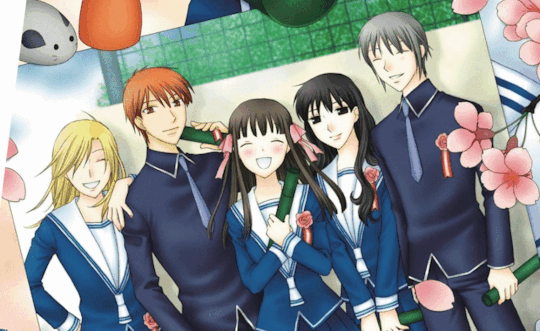
Fruits Basket has an unparalleled charm thanks to its unique blend of drama, humour and romance. This series has become a staple in the shoujo genre due to its profound character depth, compelling narrative, and immense emotional resonance. A web of multilayered character dynamics forms the foundation of Fruits Basket—where characters are not merely utilised as narrative devices, but portray the subtleties of human emotions, relationships, and development. It is precisely because the series' characters reflect real-life issues that we are able to empathesize and relate to them. The series' capacity to engage in meaningful discussions on profound concepts and convey insightful messages is the primary reason it resonates with its fans. The series weaves a variety of profound themes into its narrative, including loss, acceptance, transformation, healing, love, societal expectations, parental alienation, familial connections, and the cyclical nature of life. The series' emotional impact is established by incorporating the aforementioned themes—which not only enhance its complexity but also foster introspection and empathy within its fans.
#03 Naruto + Naruto Shipudden

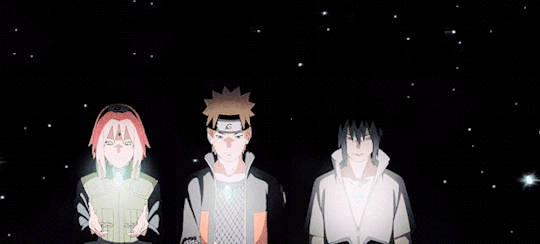
Regardless of its shortcomings, detractors cannot dispute that the Naruto series has significantly influenced pop culture—evolving the animanga industry and influencing audiences on a global scale. The series' popularity stems from its complex storytelling, emotional depth, large multi-faceted cast and exploration of profound themes. To this day, the Naruto series continues to be relevant, having cemented itself as a cornerstone in the history of the animanga industry. The series has not only inspired numerous creators, but it has also played a significant role in the integration of anime and manga into global mainstream pop culture. The themes addressed in the series add greatly to its narrative depth and resonance—not only enhancing audience engagement but also providing them with valuable lessons. Some typical themes explored by the series are friendship, personal growth, and perserverence admidst adversity. While some of its more profound themes include the vegeance, redemption, the cycle of hatred, the reprecussions of war and conflicting ideals of peace. The series employs these themes to not only enhance its character arcs and layer its narrative—but also to encourage its audience to contemplate their implications within human interactions, historical contexts and the systems of society. The series' continuing relevance as a pivotal reference for analysis and discussion is a direct result of the adept integration and complexity of these themes. Another essential component of the series is its character development which not only drives the narrative but also enables viewers to empathise with its characters. Throughout the series, we encounter an array of compelling characters whose development and interactions significantly contribute to the series' depth and appeal. Considering that this series was a significant part of my childhood, it will always hold a special place in my heart. I practically grew up alongside its characters, which has made their hardships, conundrums and triumphs all the more personal. Given this was the first anime series I completed, it was the catalyst for my current passion for anime and manga.
#02 Gintama


Let me go off script and say that I know this series' length is off-putting to a lot of people—but I promise it is absolutely worth it... Though I wouldn't reccomend this series for everyone. I myself quit this anime about 4 times despite liking the characters. However, I'm glad that something (cough opening 13 cough) convinced me to stick with it—since it has become my favourite anime now. This series is set in a fictionalised version of Japan's Edo period, where aliens have invaded the nation after having defeated its samurai. This bizarre premise serves as the foundation for the show's quirky characters and absurd happenstances. Gintama has made an everlasting impression on the animanga industry due to its distinctive amalgamation of genres, outstanding character development, and capacity to weave together comedic and serious narratives. Gintama is infamous for its comedy. Its ability to parody various sectors of pop culture, including other animanga, is second to none. The series is able to poke fun at both itself and the animanga industry thanks to its satirical take on classic shonen tropes. The series' unapologetic willingness to take risks has contributed towards it becoming a cornerstone in the animanga industry thereby influencing numerous subsequent works. The series also humorously explores an array of social and cultural issues, not only providing entertaining social commentary but also reflecting society, thereby fostering introspection and discourse on a number of topics. This not only enables it to delve deeper into its complex themes but also to surpass conventional anime archetypes. Unexpectedly Gintama is adept at balancing its comedic elements with its profundity, allowing fans to resonate with the series on a deeper level. The series' core themes include resilience, mental fortitude, honour, loss, camaraderie, platonic bonds, and maintaining optimism when confronted with adversity. Gintama's enduring appeal stems from its distinctive, diverse, and colourful ensemble of characters. Their differing personalities, experiences, and peculiarities add to the series' humour, relatability, and complexity. We witness these characters face many obstacles as they grow and evolve thus deepening our connection with them.
#01 Tian Guan Ci Fu
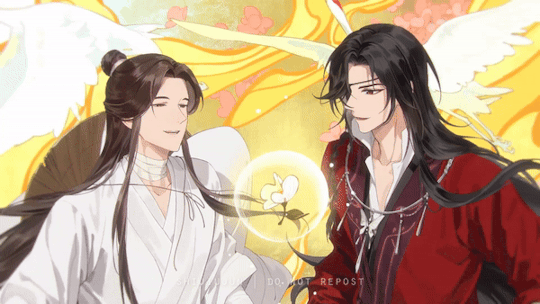
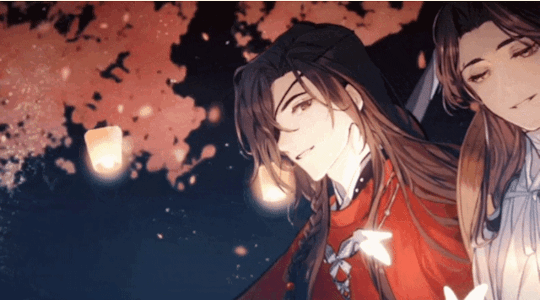
For those unfamiliar, MDZS (ranked as #8 on this list) and TGCF are written by the same author, MXTX—thus, many of my statements there also apply here. Despite consuming almost every adaptation of this series—the novel, the donghua and the manhua—I have never grown tired of it as every rendition presents a novel perspective on the characters and setting and is enlightening in its own right. This series deftly integrates action, comedy, mystery, horror, fantasy and romance—while also drawing inspiration from Chinese culture and mythology, to create a riveting story that draws you in from its start. Although I wouldn't want anyone to value this series solely based on its romance—it is undeniably its most captivating aspect with its main couple being the epitome of devotion, longing and enduring love. Similarly to MDZS, the TGCF donghua is heavily censored when it comes to its romantic dipictions under China's censorship regulations. This becomes especially noticeable when comparing it to Japanese animated BL series. Nevertheless, the production team's meticulous attention to detail ensures that the affection between the main couple remains just as apparent as in the novel. In no other series have I paid as much attention to the characters' movements, expressions, and tones as I did with TGCF. HuaLian's affection for one another is palpable through every held glance, melodic sigh, and subtly delicate touch. Consequently, this meticulous attention to detail allows for a steady build-up—resulting in an immensely authentic and sincere romance. The series' amalgamation of its fantastical setting and mystical elements with Chinese traditions and mythology augments its richness and immersiveness. Furthermore, each song in the donghua is flawlessly crafted to complement each scene—creating the ideal ambiance. The series touches on a multitude of heavy topics providing insightful commentary on social expectations—making it worthwhile for those seeking depth and complexity. Among the themes featured are duty, sacrifice, redemption, vengeance, unconditional love, acceptance, perception as opposed to actuality, and the correlation between free will and fate. One understated feature of the series that I appreciate is its deft deployment of motifs and symbolism to represent characters and their growth as well as to hint at impending plot points. Flowers, colours and other celestial symbols are recurring motifs in the series that add depth to the narrative. It is undoubtably the series' complex characters and intricate character relationships that form the core of TGCF—adding substantially to its allure. Our lead characters are incredibly multifaceted and nuanced, possessing distinct motivations and principles—while remaining charming and endearing. In contrast, each side characters in the series adds complexity and intrigue to the narrative—enriching the series without detracting from the main characters' roles while remaining well-rounded.
✧⋄⋆⋆⋄✧⋄⋆⋅⋆⋄✧⋄⋆⋅⋆⋄✧⋄⋆⋅⋆⋄✧⋄⋆⋅⋆⋄✧⋄⋆⋆⋄✧
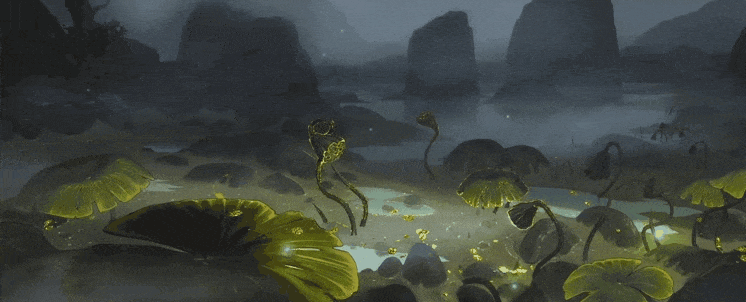
[P.S. Were any of you guys who regularly see my posts surprised by this list? I'm willing to address any questions you have regarding these entries, and I hope it encourages anyone who hasn't seen any of these series to do so. Once again I'm sorry for rambling...Hope this answered your question. ]
✧⋄⋆⋆⋄✧⋄⋆⋅⋆⋄✧⋄⋆⋅⋆⋄✧⋄⋆⋅⋆⋄✧⋄⋆⋅⋆⋄✧⋄⋆⋆⋄✧
#frostffire-asks#mytop10series#anime#donghua#manga#animanga#mxtx#shoujo#tian guan ci fu#tgcf#naruto#naruto shippuden#gintama#fruits basket#fruits basket 2019#boku no hero academia#akatsuki no yona#yona of the dawn#kimetsu no yaiba#demon slayer#mdzs#mo dao zu shi#link click#the apothecary diaries#kusuriya no hitorigoto#my hero academia#shiguang daili ren#bnha#grandmaster of demonic cultivation#mha
13 notes
·
View notes
Note
Hello! Can I ask, what are your top 5 (or top 10) favorite media ever (can be anime/manga, tv series, books, movies, etc)? Why do you love them? What made those media special to you?Thanks ⭐
Hi! Sorry for the wait. I've been dealing with a backlog of asks and have been tackling them in chronological order... Someone else already sent in the same question... So as to avoid redundancy, here's the link to that post:
Thanks nonetheless for sending in an ask, though! Apologies for the inconvenience🌻

#frostfire-asks#my-asks#anime#manga#donghua#manhua#animanga#shoujo anime#anime rambles#shoujo manga#top10series#mytop10series#mytop10anime
1 note
·
View note